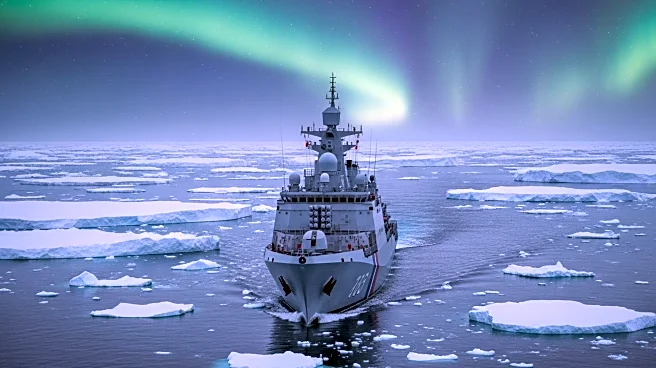What's Happening?
Denmark has announced a significant expansion of its Arctic naval capacity through the Second Agreement on the Arctic and North Atlantic. This agreement, in collaboration with Greenland and the Faroe Islands, includes the acquisition of two additional Arctic vessels, enhanced maritime patrol aircraft capacity, a new headquarters for Joint Arctic Command, additional drones, and a North Atlantic undersea cable. The total planned acquisitions amount to DKK 27.4 billion ($4.3 billion). These investments are part of Denmark's ongoing efforts to strengthen the operational effectiveness of its armed forces in the region, following previous agreements aimed at improving surveillance and sovereignty assertion.
Why It's Important?
The expansion of Denmark's Arctic naval capacity is crucial in the context of increasing geopolitical interest in the Arctic region. As global powers vie for influence and resources, Denmark's strategic investments enhance its ability to monitor and respond to potential threats. This move not only bolsters Denmark's defense capabilities but also reinforces its commitment to maintaining sovereignty and security in the Arctic. The investments could have broader implications for regional stability and international relations, particularly as other nations may respond to Denmark's increased presence in the area.
What's Next?
Denmark's continued focus on Arctic defense suggests further developments in regional security strategies. The new capabilities may prompt other Arctic nations to reassess their own defense postures, potentially leading to increased military activity in the region. Additionally, Denmark's collaboration with Greenland and the Faroe Islands could strengthen political ties and foster cooperative security initiatives. As the Arctic becomes more accessible due to climate change, Denmark's proactive approach may serve as a model for other countries seeking to balance environmental concerns with strategic interests.
Beyond the Headlines
The expansion of Denmark's Arctic naval capacity highlights the ethical and environmental considerations of increased military presence in sensitive regions. As nations invest in defense infrastructure, the potential impact on local ecosystems and indigenous communities must be carefully managed. Denmark's approach may set a precedent for responsible military development, emphasizing the importance of balancing security needs with environmental stewardship.











